Know Thyself: What Is Self-Awareness, and How to Be More Self-Aware?

In this article
Do we really know everything about ourselves? Far from it!
Bob’s a perfectionist who tries to do everything just right. They’re too hard on themselves, but they can’t recognize this is self-sabotaging behavior.
Kate keeps changing her career path but ends up disappointed with her choices, unable to connect with her true passion for gardening.
Andy often snaps at their loved ones and regrets it. But he isn’t aware of the real source of his anger and what to do with it. He can’t even name this emotion.
These stories illustrate that what we know about ourselves is often just the tip of the iceberg, a starting point for self-discovery. And there are deeper levels to go. We can move from superficial ideas to invaluable insights about ourselves. All we need for exploration is a special skill — self-awareness.
Self-awareness is not only the latest buzzword in Instagram for “living in the present” but also one of the key skills for living life to the fullest. Let’s find out why and what you can do to improve yours.
What is self-awareness?
Self-awareness is a cornerstone of emotional intelligence (EQ) and a fundamental component for developing self-concept. [1] Eurich, T. (2023, April 6). What Self-Awareness really is (and how to cultivate it). Harvard Business Review. https://hbr.org/2018/01/what-self-awareness-really-is/
Self-awareness is not about possessing all possible knowledge about yourself. Rather, it is the ability to gain insights about your emotions, feelings, needs, strengths and weaknesses, triggers, thoughts, motives, behaviors, dreams, and traits that refer to internal self-awareness.
It’s also the ability to process feedback from other people and clearly see how they perceive you — external self-awareness. [2] Morgan, J. (2021). Internal versus external Self-Awareness. Jacob Morgan | Best-Selling Author, Speaker, & Futurist | Leadership | Future of Work | Employee Experience. https://thefutureorganization.com/internal-versus-external-self-awareness/
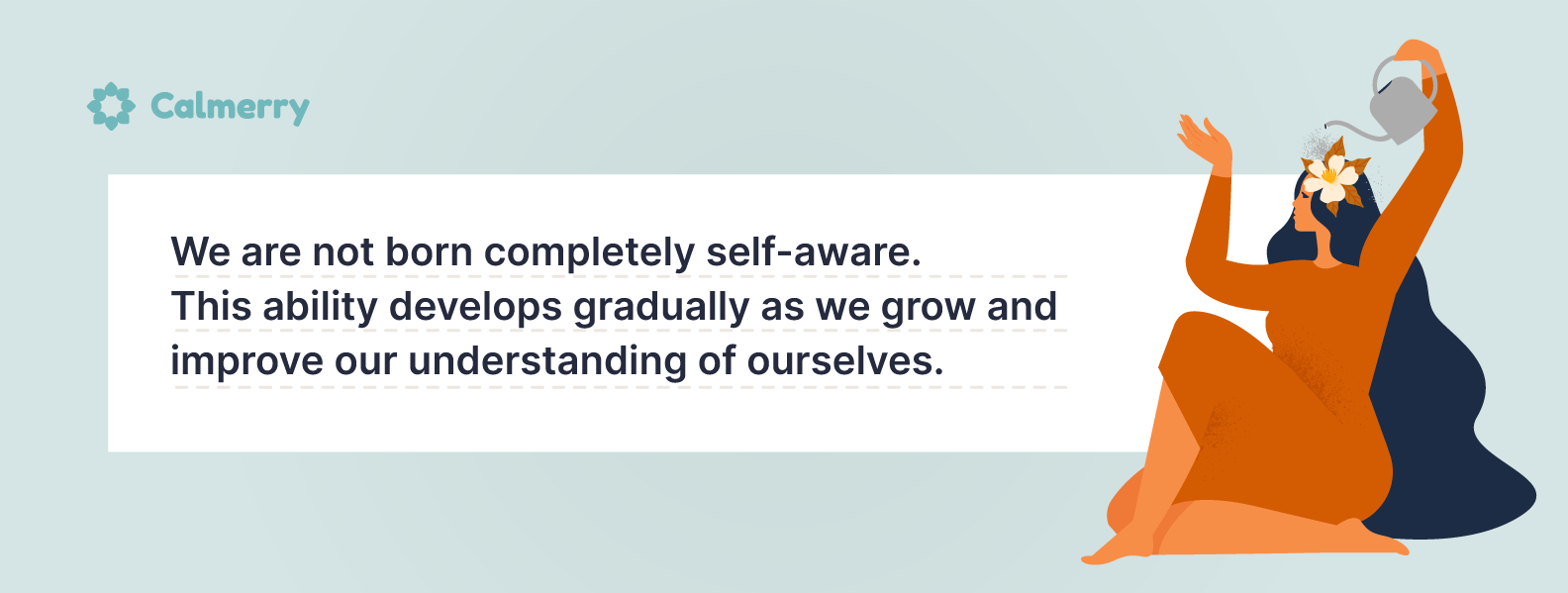
When does self-awareness develop?
We are not born completely self-aware. This ability develops gradually as we grow and improve our understanding of ourselves. [3] Berger, M. (1995). Handbook of Infant Mental Health. Edited By Charles Zeanah. New York: Guilford Press.1993. 501 pp. £39.95 (hb). The British Journal of Psychiatry, 167(3), 425-426. doi:10.1192/S0007125000065430
- It begins during the first year of life when an infant starts differentiating their own movements from their mother’s.
- At 18-24 months, a toddler starts discovering themselves and recognizing their reflection in the mirror.
- At school age, a child actively relies on conscious experience and memory and begins to develop interests, likes, and dislikes, which translates into a sense of self.
- During adolescence, a person becomes aware of their emotions and learns to be in touch with them, understanding how those emotions impact their lives.
However, the progress doesn’t stop at this stage.
Your self is evolving and dynamic and becomes even more complex as life experiences layer up. So, there’s always something to develop and discover regarding awareness and consciousness.
Why is self-awareness important?
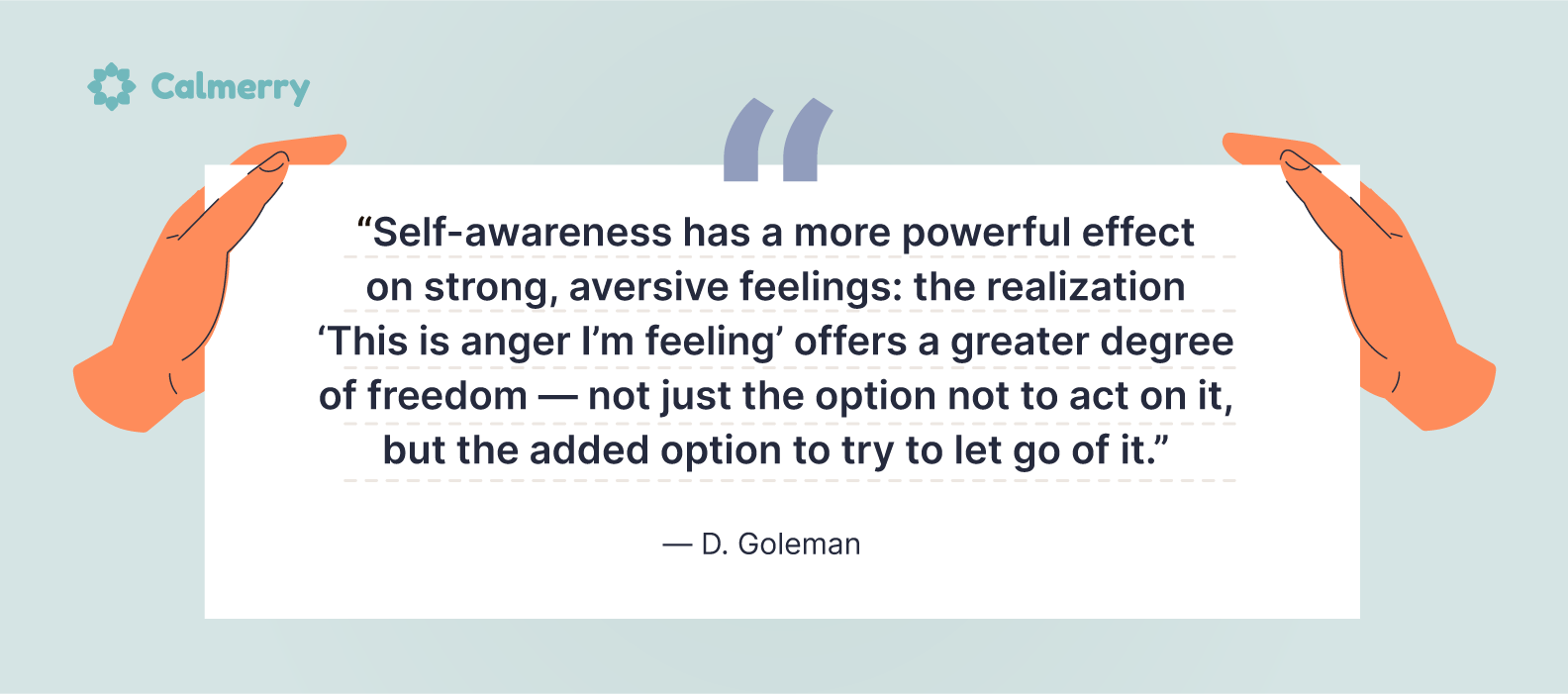
Today, many talk about self-awareness as a vital tool for leaders and the basis of personal growth and success — and for a good reason. [1] Eurich, T. (2023, April 6). What Self-Awareness really is (and how to cultivate it). Harvard Business Review. https://hbr.org/2018/01/what-self-awareness-really-is/
Self-awareness helps you delve inward, pay attention to the outer world, and monitor your inner self without judgment. It also provides you actionable insights on what drives or drains you, what you need to feel secure, what your likes are, whether your actions align with your standards, why you’re angry, how your actions impact the environment, and how you deal with your emotions.
Self-awareness is at the heart of many important and rewarding things in life. It’s a compass that can guide you in moments when you don’t have all the answers.
So, practicing being more self-aware can help you:
- Know who you are and what you want to accomplish
- Stay mindful of your needs
- Be in control of your thoughts instead of letting them control you
- Recognize what emotions you’re feeling at any given time and why
- Know the links between your emotions, feelings, thoughts, and actions
- Decrease anxiety, stress, and depression levels
- Accept and get value from compliments and candid feedback more easily
- Set healthy personal boundaries and respect those of others
- Build self-acceptance and learn to be comfortable with uncomfortable (e.g., “negative” emotions, imperfections, etc.)
- Improve your decision-making and make healthy choices grounded in your own values
- Be better equipped to understand others
- Nurture healthy self-esteem and self-image
- Reconnect with your true self
- Find out your strengths and limitations
- Improve your relationships and communication skills
- Choose how to cope with challenges
This list goes on because self-awareness isn’t a finite process — it’s a lifelong effort that always has more to bring you in different aspects of life.

Lack of self-awareness – signs and effects
People who lack self-awareness tend to stay at unfulfilling jobs they hate or in unhappy relationships, repeat the same patterns, and be vague about their feelings and unable to express them healthily.
They often get defensive when given feedback, have low confidence, experience challenges with saying “no,” and generally find living a truly happy and productive life difficult. [4] Eurich, T. (2018, December 11). Working with People Who Aren’t Self-Aware. Harvard Business Review. https://hbr.org/2018/10/working-with-people-who-arent-self-aware
Here are some additional signs that may indicate a lack of self-awareness:
- Unawareness of personal biases and prejudices
- Inability to reflect on past experiences and learn from them
- Reliance on external validation for self-worth
- Repeating self-sabotaging behaviors or falling into negative patterns
- Difficulty recognizing and expressing emotions effectively
- Resistance to receiving feedback or constructive criticism
- Lack of clarity in personal values, goals, and aspirations
- Inconsistent behavior and inability to identify patterns in actions
- Disregarding personal boundaries and difficulty saying “no”
- Reacting impulsively without considering the consequences
- Challenges to empathize with and relate to others
- Limited understanding of personal strengths and weaknesses
- Habitual blaming of others for personal circumstances or failures
- Difficulty accepting responsibility for mistakes and failures
- Lack of curiosity and interest in personal growth
The good news is that you have the power to better understand your inner self and lead a more fulfilling life.
9 ways to improve self-awareness and make it a habit
According to 5-year research led by organizational psychologist Tasha Eurich, only 10-15% of people are actually self-aware. [1] Eurich, T. (2023, April 6). What Self-Awareness really is (and how to cultivate it). Harvard Business Review. https://hbr.org/2018/01/what-self-awareness-really-is/
It’s no wonder since self-awareness requires practice, time, and effort until it becomes second nature, and you learn to get in touch with your true self, discovering the answers — not “inventing” them.
Here are some strategies to help you be more self-aware:
1. Set “alone” time
One of the most effective ways to increase self-awareness is to spend more time alone. You can use this additional time for various purposes, including self-reflection, meditation, and journaling.
Still, the key is that it provides you with quiet moments when your mind is without distractions and can focus on the important.
2. Use the magic of “I”-statements to express yourself
Using the “I”-statements is an effective way to improve communication and manage anger. When you use them, you relate to your own experiences and get in touch with your feelings rather than focusing on the experiences of others or blaming them.
With the help of “I”-statements, you can become more aware of your thoughts, emotions, and feelings in the present moment and learn to deal with them more productively.
Try following this structure: “I feel…+ when…+ because… + What I need is…”
3. Explore emotions
If you can’t get in touch with your emotions and feel stuck with the first part of the construction, or want to improve your emotional literacy, use a helpful tool — Plutchik’s wheel of emotions.
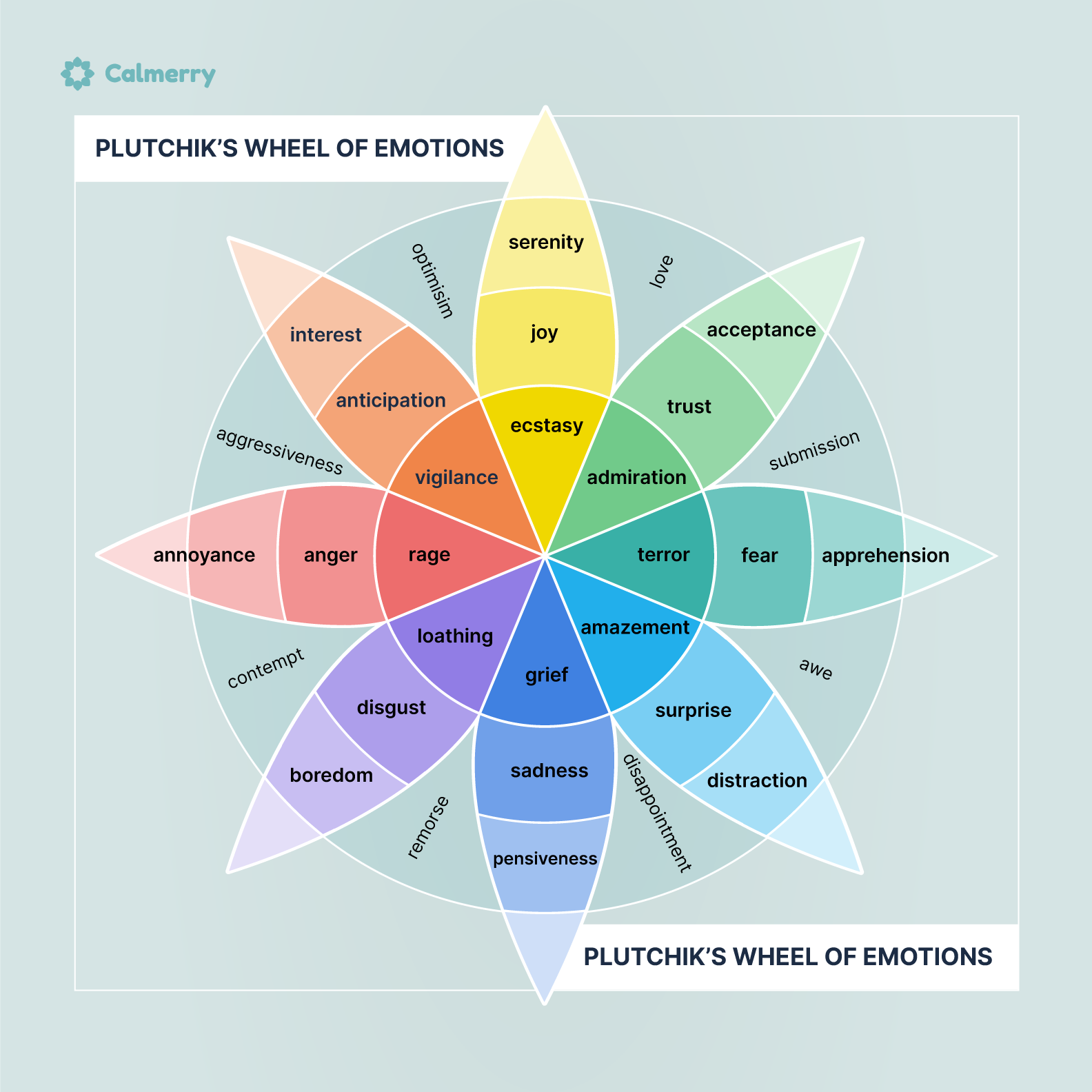
In addition, record your thoughts and feelings in a journal and track how they change over time. This can help you see patterns and understand yourself better.
If you need to track your mood and make notes regularly, our Reflection Helper Coa will be of great use to you.
Download this free worksheet that will help you explore your thoughts and feelings. Complete this exercise 2-3 times a week to increase your self-awareness, and review what you have written after two weeks.
Doing this exercise regularly will help you feel more comfortable when sharing your thoughts and feelings with others, making it easier to work through self-esteem issues. Find it in PDF format here 👉🏼 Self-Esteem Sentence Stems Worksheet
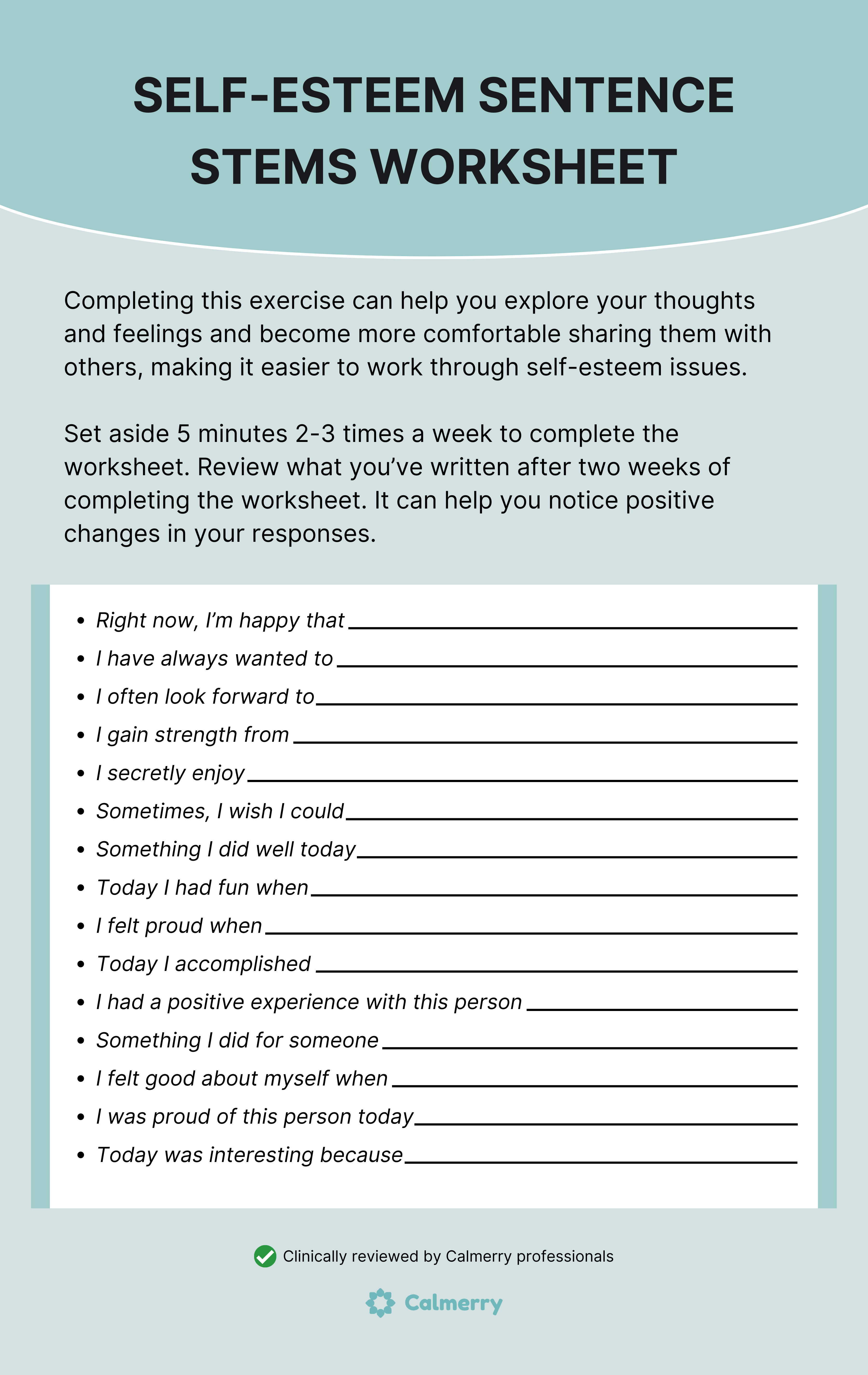
4. Be curious about who you are and ask yourself questions
If you’re the one who knows you best and worst of all, you’re not alone. We always wish to better embrace the universe we see in the mirror.
To lead your journey to better awareness of your inner self, just be open to learning as you go along.
Use introspection questions for self-reflection and learn what makes you tick:
- Who am I really?
- What are my fears?
- What matters most in my life?
- Which is worse for me: failing or never trying?
- When did I last allow someone to violate my personal boundaries?
- Have I made someone smile today?
- Why does it matter what others think about me?
Yet, there’s a trick with “Why” questions: along with productive self-insight, they might cause unproductive rumination.
It may be more helpful to try and phrase questions with “what does it mean” rather than “why” if you are susceptible to rumination. For example, “What does it mean if others think unfavorably of me?” as opposed to “Why does it matter what others think about me?”
Self-reflection isn’t always an easy walk — the process may unleash upsetting moments, depressing feelings, or some things about you that are less than positive. It’s okay.
Oftentimes, if there is resistance or uncomfortable feelings that arise during this process. That is often a cue to lean in further and be curious rather than giving into the urge to abandon the process for the sake of emotional comfortability.
These are the moments when the most insight and growth can occur!
– Tiffany Lovins, Licensed Mental Health Counselor (LMHC)
It’s not always easy, but keep learning yourself — alone or with your online therapist. Wondering what it’s like to experience the world through your own eyes is an exciting adventure that never ends.
5. Let go of judgment
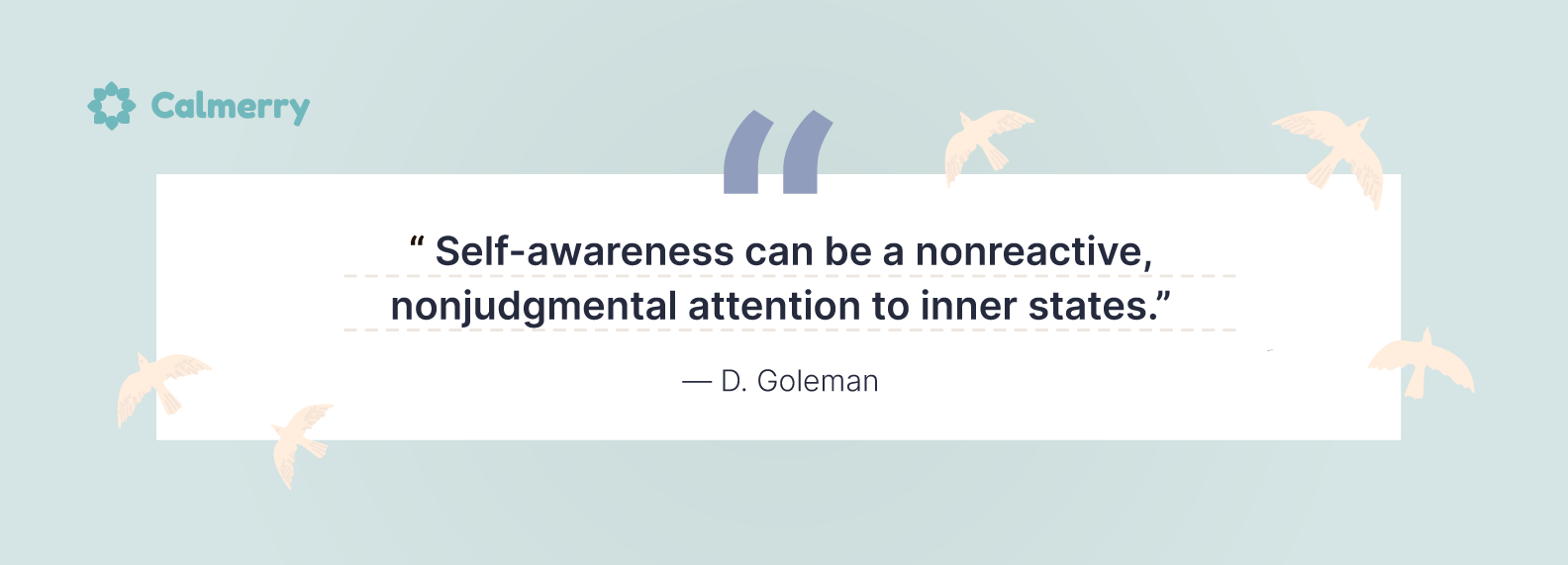
One of the main principles of practicing self-awareness is that you’re not your thoughts. Rather, you have the power to observe them apart from them and without judgment. [5] Silvia, P. J., & Duval, T. S. (2001). Objective Self-Awareness Theory: Recent progress and enduring problems. Personality and Social Psychology Review, 5(3), 230–241. https://doi.org/10.1207/s15327957pspr0503_4
However, it’s often easier said than done: developing internal and external awareness can sometimes lead to excessive self-consciousness, social anxiety, overthinking, low self-esteem, and self-doubt.
Being aware of this can help you take healthier steps to self-reflection.
So, create a space within you that sets you free from the impact of your thoughts and feelings. Watch over your thoughts, just like over the waves in the ocean that come and go.
You may describe them but don’t try to suppress or ignore your emotions.
One strategy that can help with this is by framing your thoughts and feelings as “I notice a feeling of ____ and I observe this feeling in my physical body as____. I notice a thought of______.”
This helps to prevent defining yourself by what you are experiencing and internalizing these to be the ultimate truth, rather than something to observe and be curious about. Eventually, you’ll get better at witnessing and evaluating — not obsessing and judging.
– Tiffany Lovins, Licensed Mental Health Counselor (LMHC)
6. Create a mindfulness practice
Most of the time, we operate on autopilot, not recognizing what’s going on inside or outside us. To make self-exploration a habit, ask yourself one simple question: “How do I feel right now?”
This basic question can become your daily mantra to train your brain to be aware of your emotions, feelings, bodily reactions, sensations, and triggers.
When you’re feeling anxious, bored, or frustrated, try being with the feeling mindfully without immediately turning to distraction.
- How does it feel in my body?
- Is it a tense feeling?
- Is my heart racing?
- Is my throat tight?
- Do I feel muscle stiffness?
You can observe yourself at the moment in the way that suits you best — meditation, yoga, conscious breathing, etc.
Whichever way you choose, by really tuning in to how you feel, you can learn more about yourself and gain awareness of your experiences rather than just letting them pass by.
7. Track your priorities and goals
The person you were even a year ago is probably very different from who you are today. That’s okay.
To guide how you change, create a habit of setting your goals and priorities, writing them down, and checking in with yourself regularly.
This way, you’ll be able to notice the changes, analyze them, and focus on what really matters to you for now.
8. Ask for feedback
Internal self-awareness is just one side of the coin. It’s easy to get wrapped up in our perspective, and it’s hard to see ourselves objectively. An outside perspective, however competing it may be, is equally important for getting the whole picture of self.
One way to increase your external self-awareness is to ask others how they see you and be open to getting input. This can be a difficult exercise, but feedback from people you love and respect can help you see yourself through the eyes of others and better understand how they perceive your actions, strengths and limitations, and words.
The key piece in this process is ensuring the source you seek feedback from is someone you trust and believe they have your best interest at heart.
The ability to see yourself as others see you is associated with improved empathy and leadership skills. [6] Future Talent Learning. (n.d.). What are the top 5 characteristics of emotional intelligence in good leadership? https://www.futuretalentlearning.com/top-5-characteristics-of-emotional-intelligence-in-good-leadership
9. Challenge your negative self-talk with compassion
How you talk about yourself greatly impacts your ability to embrace your potential and make positive changes in your life. When you nurture a positive relationship in your internal dialogue, it helps you flourish.
On the other hand, negative self-talk can create serious challenges on your way to self-discovery.
So learn to rechannel your inner dialogue in a healthier, more self-compassionate direction.
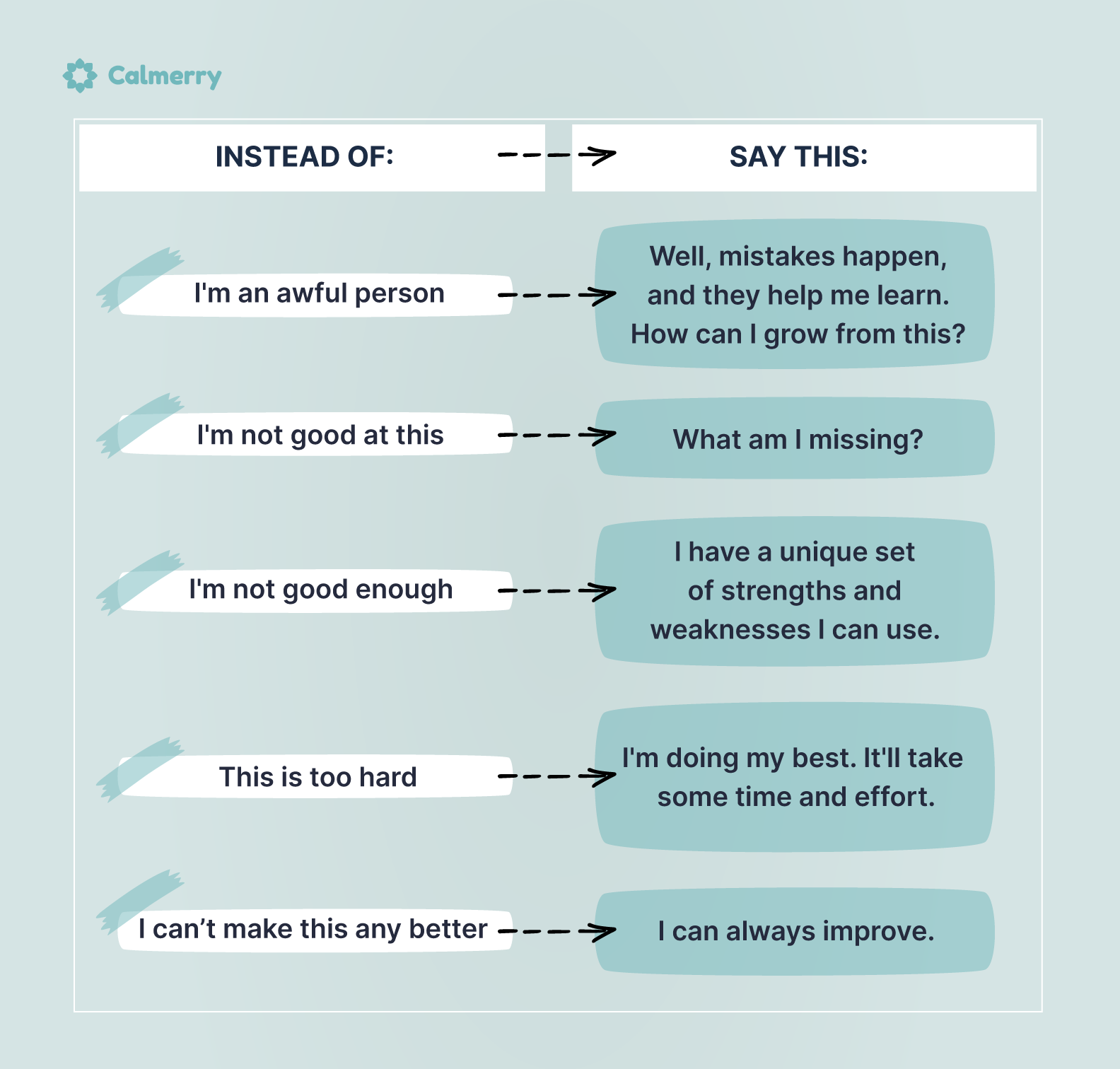
The journey of self-awareness may be challenging
Developing self-awareness and a strong sense of self can be a lonely journey. As you keep following the path to self-discovery, be prepared to discover that some people in your social network don’t get together with you or support you anymore.
In fact, some people may react strongly in a negative light or push harder to challenge healthy changes and boundaries you are setting.
Making positive changes for self can sometimes pose a threat to others in your life, where it either highlights challenges for themself in which they are not ready to practice self-awareness and/or creates situations where you are less likely to respond to their unhealthy demands or needs.
– Tiffany Lovins, Licensed Mental Health Counselor (LMHC)
That’s because becoming the best version of yourself may result in significant internal and external changes in your life. It involves re-evaluating your priorities, changing direction, learning to put your needs and desires first, exploring new sides of yourself, and abandoning the usual things or old habits that have been holding you back for years.
These changes can be hard for others to accept.
But it doesn’t mean you’re doing it all wrong. Rather, it’s a good sign that you’re more in tune with your true self and are creating room for some positive changes to come.
There’s always someone to help you
If you need emotional support on your journey, you can get it on Calmerry. Our therapists can help you become more self-aware and confident in your ability to shape your life.
Here, you can discover yourself in a non-judgmental, safe space where you can reflect on who you are, what you want to become, where you’re going, the things that make you feel good and bad, and what you need to achieve more of your potential and live a healthier life.
The path to self-awareness may be challenging, but it’s one that can lead to a life of greater peace and happiness!
Eurich, T. (2023, April 6). What Self-Awareness really is (and how to cultivate it). Harvard Business Review. https://hbr.org/2018/01/what-self-awareness-really-is/
Morgan, J. (2021). Internal versus external Self-Awareness. Jacob Morgan | Best-Selling Author, Speaker, & Futurist | Leadership | Future of Work | Employee Experience. https://thefutureorganization.com/internal-versus-external-self-awareness/
Berger, M. (1995). Handbook of Infant Mental Health. Edited By Charles Zeanah. New York: Guilford Press.1993. 501 pp. £39.95 (hb). The British Journal of Psychiatry, 167(3), 425-426. doi:10.1192/S0007125000065430
Eurich, T. (2018, December 11). Working with People Who Aren’t Self-Aware. Harvard Business Review. https://hbr.org/2018/10/working-with-people-who-arent-self-aware
Silvia, P. J., & Duval, T. S. (2001). Objective Self-Awareness Theory: Recent progress and enduring problems. Personality and Social Psychology Review, 5(3), 230–241. https://doi.org/10.1207/s15327957pspr0503_4
Future Talent Learning. (n.d.). What are the top 5 characteristics of emotional intelligence in good leadership? https://www.futuretalentlearning.com/top-5-characteristics-of-emotional-intelligence-in-good-leadership
online therapy
live video session



